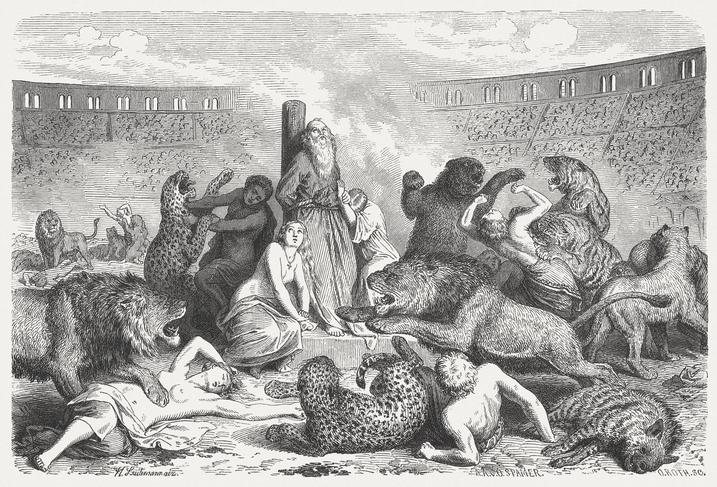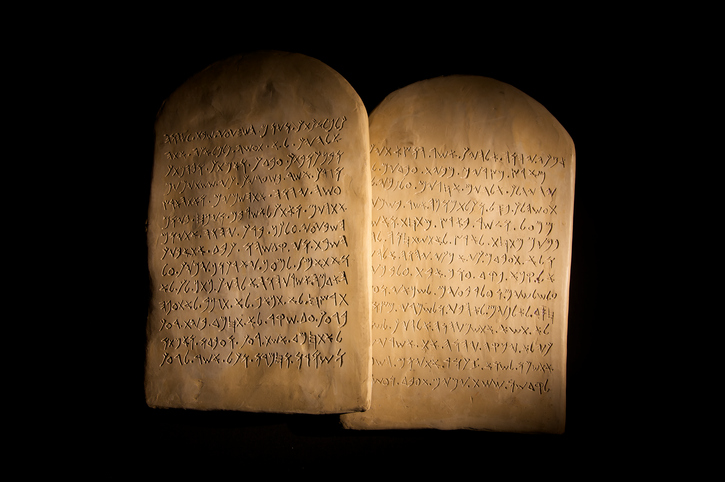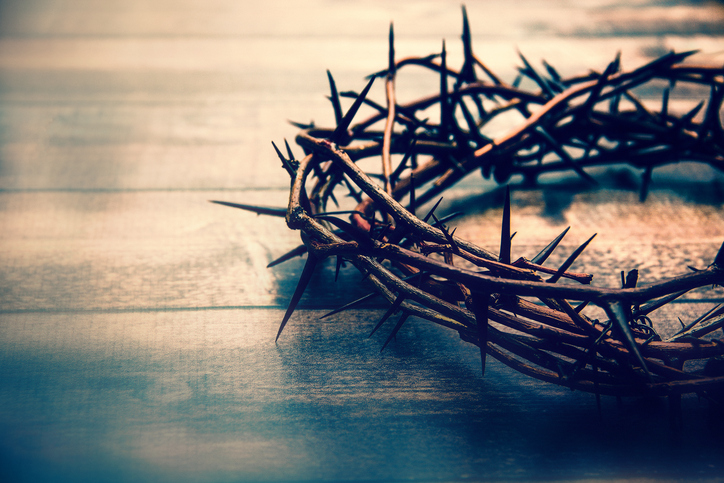Este Evangelio es tan directo que quizá nos pone incómodos. Entendemos lo que dice Jesús, pero ¿cómo nos toca al corazón? Pienso en esa persona con quien no me llevo bien, ¿puede ser que Jesús me está hablando de esa? ¡Claro que sí! Para vivir este Evangelio tengo que estar en paz con todos. Si he lastimado a alguien, tengo que pedirle perdón y reparar el daño hecho. De todos modos, la vida humana es caótica, y algunas relaciones nunca se podrán restaurar. No puedo controlar los pensamientos y las acciones de otras personas. A veces la gente se ofende cuando no teníamos ninguna intención de ofender, y rechazan cualquier relación. En estos casos dolorosos, la relación que pide Jesús tiene que tomar lugar en mi propio corazón, que no guarde rencores contra esa persona sino que rece por él/ella.
Policarpo, el santo que celebramos hoy, nos ofrece un ejemplo maravilloso de la reconciliación. Como obispo de Esmirna en Asia Menor, lo martirizaron a la edad de 86 años, alrededor del año 155. Somos afortunados poder contar con los actos de su martirio, los cuales nos dan una mirada excelente a su personalidad. El gobierno estaba persiguiendo a los cristianos, y Policarpo lo pensó prudente esconderse. Pero uno de los sirvientes de su casa lo traicionó y llevó la policía al Obispo. Cuando todos llegaron a la casa, en lugar de enojarse por la traición, Policarpo les dio la bienvenida al sirviente y a la policía y “Pidió que pusieran delante de ellos algo de comer y tomar, todo lo que quisieran, y les pidió que lo permitiera rezar por una hora sin interrupciones.” Rezó por dos horas, “acordándose de cada persona con quien había tenido contacto, tanto pequeños como grandes, distinguidos como desconocidos, y también a la Iglesia Católica entera pero todo el mundo.” Y luego lo llevaron a Policarpo a la muerte.
Estaba en paz e incluso demostró su sentido de humor. En la arena, a Policarpo le dijeron que tenía que hacer un juramento diciendo, “¡Fuera los ateos!” –significando los cristianos, a quienes llamaron ateos porque rehusaron alabar a los dioses romanos. En lugar de hacerlo, mirando a toda la muchedumbre de paganos anárquicos en el estadio, y señalándolos con su mano, les dijo “¡Fuera los ateos!” Después de que lo rogaron denunciar a Cristo, Policarpo declaró, “Lo he servido por ochenta y seis años y nunca me hizo ningún daño. ¿Cómo puedo blasfemar a mi Rey y Salvador?” Luego salió a encontrar la muerte por el fuego y la espada.
Podemos admirar la manera que Policarpo les dio la bienvenida cálida a sus propios enemigos y los sirvió, aunque habían venido a arrastrarlo a su muerte. Policarpo ofreció su propia vida en unión con el sacrificio eucarístico, lo cual había celebrado frecuentemente como sacerdote y obispo. En la Misa, nosotros también podemos ofrecer el don de nuestras vidas día tras día con un corazón abierto a todos. Que esta cuaresma nos ayude a ser más como Jesús, igual que Policarpo dio a sí mismo para el Señor.

 Sr. Marianne Lorraine Trouve’ has been a member of the Daughters of Saint Paul since 1976. She has an MA in theology from the University of Dayton and has served on the editorial staff of Pauline Books and Media for over 20 years. She is the author of several books, including Saint Thomas Aquinas, and Mary: Help in Hard Times. When she’s not writing, editing, or working on logic puzzles, she can be found blogging at
Sr. Marianne Lorraine Trouve’ has been a member of the Daughters of Saint Paul since 1976. She has an MA in theology from the University of Dayton and has served on the editorial staff of Pauline Books and Media for over 20 years. She is the author of several books, including Saint Thomas Aquinas, and Mary: Help in Hard Times. When she’s not writing, editing, or working on logic puzzles, she can be found blogging at 
 CatholicMom.com was started by Lisa Hendey in 2000 to create a community for Catholic parents to share insights on living their faith with their family. The website has grown substantially over the years to become a rich resource for all Catholics seeking spiritual enrichment for their families. It continues to provide fresh perspectives from the enriching columnists and contributors with daily articles and reflections as well as book and tech recommendations.
CatholicMom.com was started by Lisa Hendey in 2000 to create a community for Catholic parents to share insights on living their faith with their family. The website has grown substantially over the years to become a rich resource for all Catholics seeking spiritual enrichment for their families. It continues to provide fresh perspectives from the enriching columnists and contributors with daily articles and reflections as well as book and tech recommendations.

 As a Solutions Evangelist for Diocesan, Tommy is committed to showing parish and diocesan staffs how to use our communication tools to their best advantage. He has worked for years in various, youth ministry, adult ministry, and diocesan roles. As an expert on Catholic communication, Tommy uses his parish and diocesan experiences to help you make your ministry effective. To bring Tommy to your parish or for general inquiry, contact him at
As a Solutions Evangelist for Diocesan, Tommy is committed to showing parish and diocesan staffs how to use our communication tools to their best advantage. He has worked for years in various, youth ministry, adult ministry, and diocesan roles. As an expert on Catholic communication, Tommy uses his parish and diocesan experiences to help you make your ministry effective. To bring Tommy to your parish or for general inquiry, contact him at 
 Veronica Alvarado is a born and bred Texan currently living in Michigan. Since graduating from Texas A&M University, Veronica has been published in the Catholic Diocese of Austin’s official newspaper, Catholic Spirit, as well as other local publications. She now works as the Content Specialist in Diocesan’s Web Department.
Veronica Alvarado is a born and bred Texan currently living in Michigan. Since graduating from Texas A&M University, Veronica has been published in the Catholic Diocese of Austin’s official newspaper, Catholic Spirit, as well as other local publications. She now works as the Content Specialist in Diocesan’s Web Department.
 During the week, Matt is a mentor for individuals who have developmental and intellectual disabilities. On the weekends, he is a drummer for Full Armor Band.
During the week, Matt is a mentor for individuals who have developmental and intellectual disabilities. On the weekends, he is a drummer for Full Armor Band.